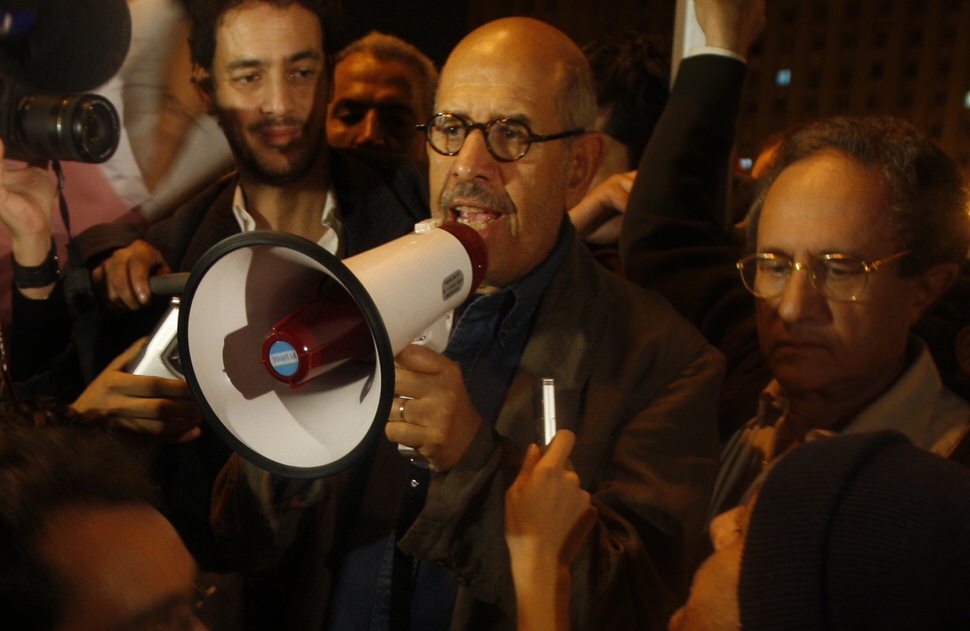Egypt’s gonna get one too,
Just to use on you know who.
—Tom Lehrer, “Who’s Next?”
The current turmoil in Egypt and the prospect of the collapse of Hosni Mubarak’s regime apart from everything else raise questions about the country’s nuclear program and where it might be headed. This is particularly interesting since a leading candidate to head the new opposition appears to be Mohammed ElBaradei, the former head of the International Atomic Energy Agency (IAEA), who has been critical of the Egyptian program in the past.
In March of 2005, ElBaradei issued an IAEA report saying that there were “matters of concern” involving the Egyptian nuclear program: the IAEA had found evidence that Egypt had failed to declare experiments it had been conducting involving, in “small amounts,” the separation of plutonium and uranium enrichment which can be done without a large enrichment facility. This was in violation of an IAEA safeguards agreement Egypt had signed in 1981. (Egypt’s two reactors and other nuclear facilities are run by the Egyptian Atomic Energy Authority under the supervision of the International Atomic Energy Authority.)
Although Egypt is not counted among countries with the bomb, its nuclear weapons program began under Gamal Abdel Nasser in 1954. At the time, Egypt was aligned with the Soviet Union, and the Russians sold it a small power reactor, which was located in Imchass in the Nile Delta some sixty kilometers east of Cairo. At about the same time, the Egyptians also tried to buy a heavy water reactor that would have been suitable for making plutonium. They also made unsuccessful attempts to buy either bombs or bomb materials from the Soviet Union and China, and Egypt began to develop a ballistic missile system that might have assisted future efforts to produce nuclear weapons. After Israel announced it was building a reactor at Dimona in 1960, Egypt is believed to have accelerated its pursuit of nuclear technology. Still, Nasser’s interest in getting a bomb seems to have been sporadic; he apparently never authorized a separate budget for nuclear weapons.
Under Nasser’s successor, Anwar Sadat, Egypt appeared to downplay talk about weapons, though it continued to pursue nuclear power; in 1981, Egypt ratified the Nuclear Nonproliferation Treaty and came under the IAEA safeguards regime. Nevertheless, the government of President Hosni Mubarak has had dealings with other nuclear source countries about nuclear technology. In 1992, Egypt signed a contract with the Argentines to build a second and substantially larger reactor—it would have eleven times the power output of the 1954 Russian reactor. Both of these reactors are much too small to produce any significant amount of power for civilian use or plutonium; they are designed for training purposes and for the manufacture of medical isotopes. In this, they resemble the Tehran Research Reactor in Iran’s capital, and like it, they use partially enriched uranium as fuel. The new Egyptian reactor went critical in February of 1998. According to some recently disclosed Wikileaks memos, Mubarak was also offered nuclear assistance, including “nuclear scientists, materials, and even weapons,” from some former Russian republics in the 1990s, but declined.
Along with the plutonium experiments, the IAEA’s critical report in 2005 related to the discovery of some traces of highly enriched uranium, which raised more questions: Egypt has some natural uranium but there is no evidence that it has an enrichment facility. In late 1964, when Nasser was stepping up his efforts to gain nuclear technology, it appears that the Egyptian government made contact with Gernot Zippe the Austrian engineer, who was one of the creators of the modern centrifuge and was a consutant to the European centrifuge industry. But Zippe also received visits from the Mossad and decided not to take up the Egyptian offer. I had some conversations with Zippe before his death and asked him about it, but he would not tell me anything. The Egyptians did manufacture a small amount of uranium hexafluoride, which is what one would use in a gas centrifuge. What troubled El Baradei in 2005, however, was not Egypt’s nuclear activity, which was legitimate, but the fact that the Egyptians were trying to do it covertly.
In 2007, Hosni Mubarak announced that the government planned to construct larger power reactors, but until very recently nothing was said about a weapons program. The prospect of Iran’s getting close to being able to produce nuclear weapons, however, changed everything. Last year, Mubarak said that Egypt would have to get nuclear weapons to defend itself. The Mubarak government claimed that since the Israelis have the bomb, Egypt too has the right to complete the nuclear fuel cycle, although no concrete steps seem to have been taken in that direction.
But now the Egyptian people are in the streets along with ElBaradei. If he is part of a new government that emerges, one hopes that his attitude towards nuclear proliferation will not change, though the Muslim Brotherhood—which is known to be hostile to Israel and which has in recent years called for Egypt to acquire a nuclear deterrent—could put new pressure on the government to pursue a bomb. No one knows how this will turn out but of one thing we can be grateful: unlike in Pakistan, which faces instability of its own and has apparently doubled the number of its nuclear weapons to about a hundred, there aren’t any nuclear weapons in Egypt that might fall into the wrong hands.
Advertisement


